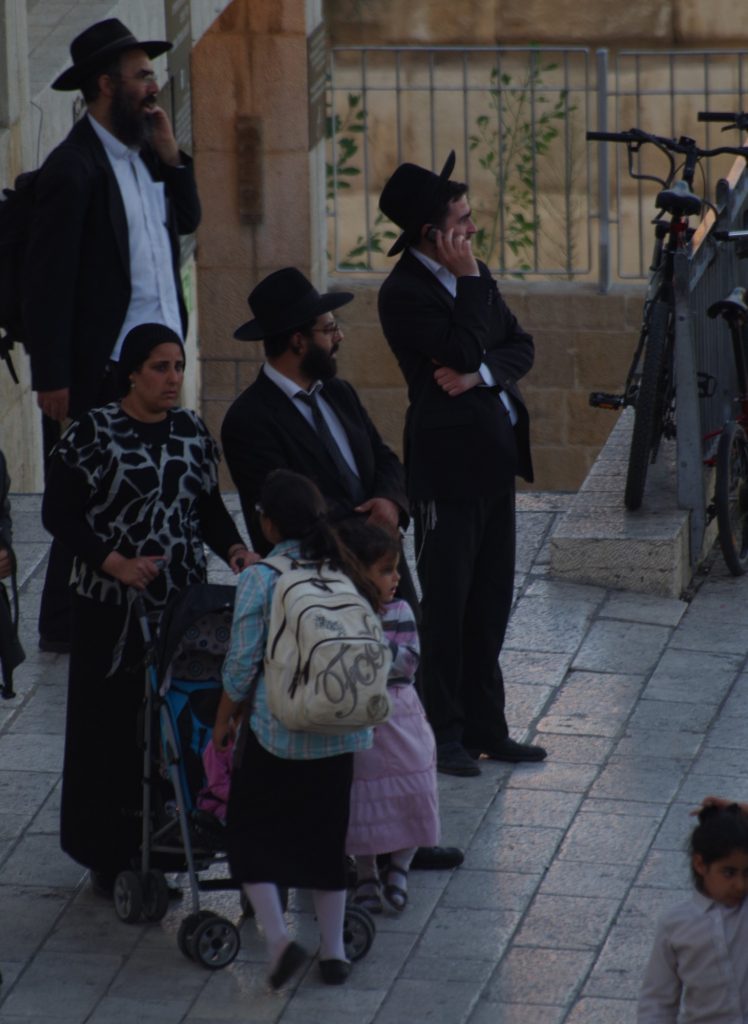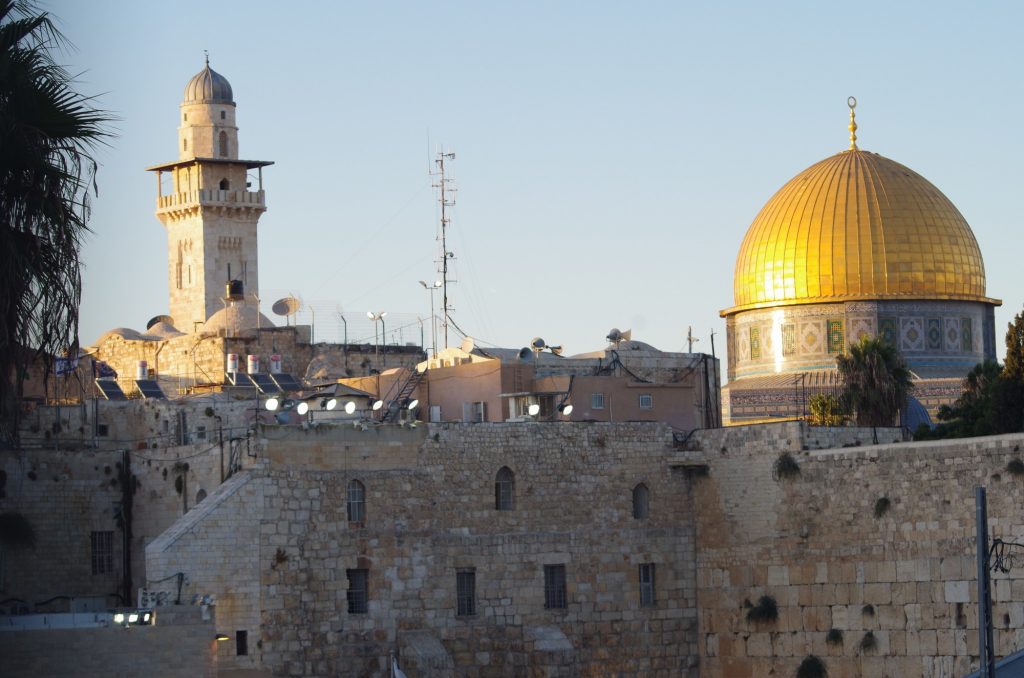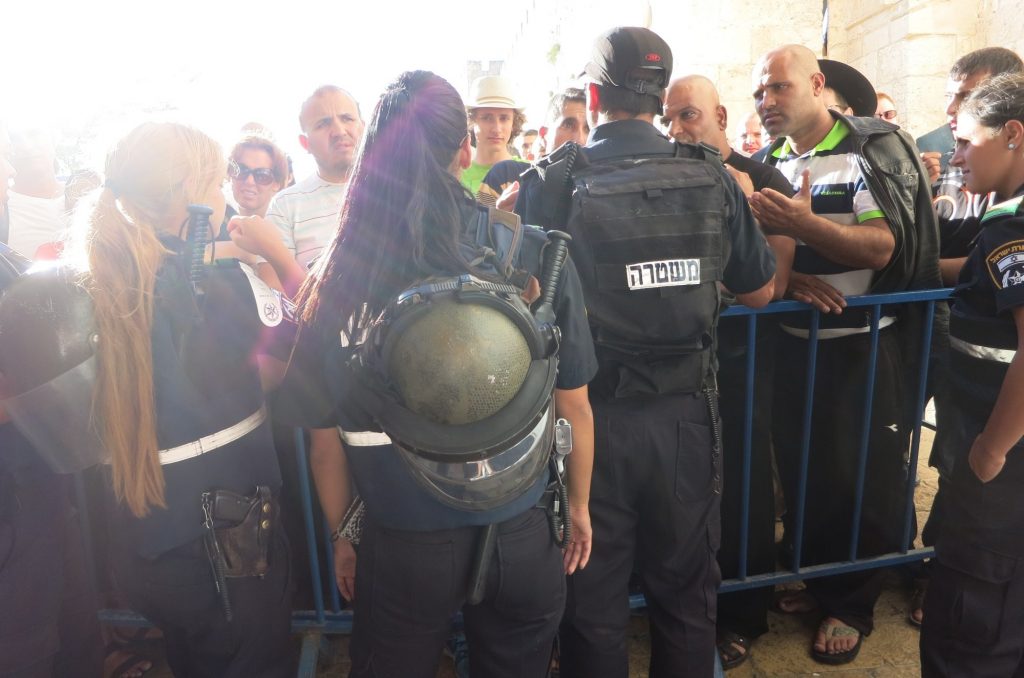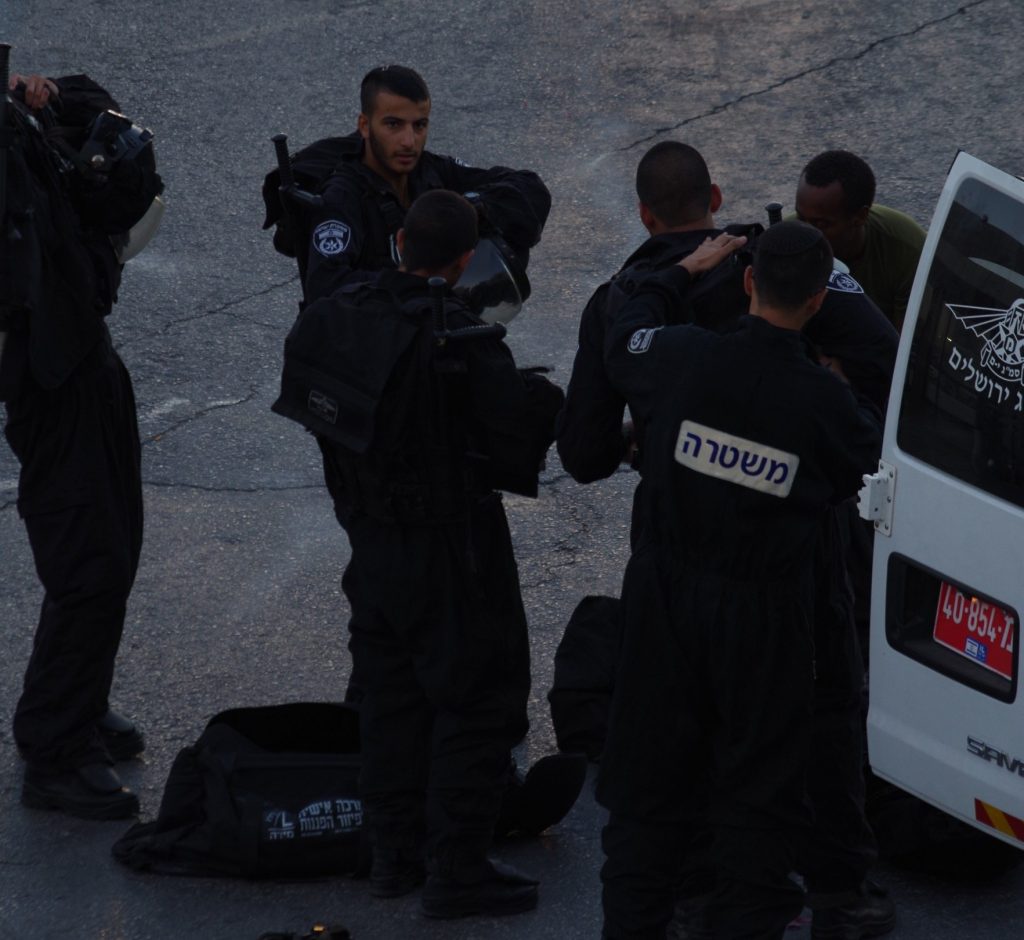The Mundane in Jerusalem
A protest march in the West Bank turned violent last night when it was stopped by riot police at the checkpoint between Ramallah and Jerusalem.
Also last night, I had a very pleasant meal with my cousins at an Italian restaurant right outside the Jaffa Gate to the Old City of Jerusalem.
The coexistence of ordinary, everyday life with outbursts of anger and violence is what keeps surprising me since we arrived a few days ago.
In the early evening, we arrived at the Jaffa Gate, which was blocked by a mob of people, mostly men–most of whom looked like Palestinians–and a scattering of tourists like us. Police at the gate were checking papers and letting some of the men and all of the tourists through.
We figured that this was probably an attempt on the part of the Israelis to keep suicide bombers out, and we went on to the Western Wall, where the bar mitzvah boy and his family had gone to say a prayer. They decided to do this last night instead of tonight because tonight is the end of Ramadan, and they feared that there would be trouble at the wall.
They had been warned by guards to make it quick. Prayers at the mosque above the wall would end soon, and they didn’t know if people up there would start throwing stones down.
Nothing happened. People prayed below the wall and people prayed above the wall. I’d bet they were all praying for peace.
On the way back through the Old City to the Jaffa Gate, as we were strolling and chatting with the family, we noticed that large police vans had pulled up and men were busy dressing themselves in riot gear. Something was going to happen: that was clear.
At the same time, lots of people were strolling around in the cool evening air: Hasidic Jews with their children trailing after, tourists with cameras, mothers with babies in strollers. The evening sun on the light stone of the ancient walls turned them golden. The Dome of the Rock shone in the sun. A flock of sparrows chirped loudly in a tree above the Western Wall plaza.
Despite the proximity of heavily-armed men (my son explained that those wider-mouthed rifles launch tear gas canisters), no one seemed to be in a hurry. They strolled. They stopped and looked. The tourists took pictures. Just another lovely evening in the Old City.
We left the Old City and settled into a restaurant on a new, chic, pedestrian shopping street just outside. All along our walk to the restaurant, more riot police passed us in the other direction, and, still, life around us went on as usual. In this shopping district, the stores were still open. The bar mitzvah boy’s grandmother bought him a new shirt at The Gap. A “living statue” performed for some children. The jewelry store was open.

My cousin told me today that she’s experienced three of the sirens, warning of incoming rockets. She said that she was in a restaurant during the first one. Everyone calmly stood up and moved to a safer part of the room, away from the windows that could shatter. After a few minutes, they went back to their tables and enjoyed their meals.
The Israelis have become so used to living this way that it’s become mundane. Yes, they’re concerned. Yes, they keep informed of what’s going on and where. Yes, they want the fighting to stop. But they seem unshakeable until something actually happens near them.
I suspect that the same applies to the Palestinians in the West Bank, since this conflict is primarily happening elsewhere: in Israel where sirens go off, warning of incoming Hamas rockets, and in the Gaza Strip, where Israeli retaliation is ongoing.
I haven’t talked in great detail about the conflict with anyone here yet, but so far the consensus among Israelis I’ve met is this: they’re fed up. They want peace. But they want real peace, without random attacks from Gaza.

I suggest, “But if Israel stopped the attacks on Gaza, Hamas would come under pressure to stop their rocket attacks, and eventually they would.”
Their argument is “But we’ve tried that and they wouldn’t. They’ve been shooting at us for years and we didn’t respond. It didn’t help.”
In the meantime, waiting for the peace they’re praying for, life goes on as usual.
Feel free to comment below, but please keep it civil! Remember that I am not a journalist and am not attempting to “cover” the story comprehensively or objectively. I am a blogger, reporting what I see and feel and that’s all.
My travel recommendations
Planning travel
- Skyscanner is where I always start my flight searches.
- Booking.com is the company I use most for finding accommodations. If you prefer, Expedia offers more or less the same.
- Discover Cars offers an easy way to compare prices from all of the major car-rental companies in one place.
- Use Viator or GetYourGuide to find walking tours, day tours, airport pickups, city cards, tickets and whatever else you need at your destination.
- Bookmundi is great when you’re looking for a longer tour of a few days to a few weeks, private or with a group, pretty much anywhere in the world. Lots of different tour companies list their tours here, so you can comparison shop.
- GetTransfer is the place to book your airport-to-hotel transfers (and vice-versa). It’s so reassuring to have this all set up and paid for ahead of time, rather than having to make decisions after a long, tiring flight!
- Buy a GoCity Pass when you’re planning to do a lot of sightseeing on a city trip. It can save you a lot on admissions to museums and other attractions in big cities like New York and Amsterdam.
- Ferryhopper is a convenient way to book ferries ahead of time. They cover ferry bookings in 33 different countries at last count.
Other travel-related items
- It’s really awkward to have to rely on WIFI when you travel overseas. I’ve tried several e-sim cards, and GigSky’s e-sim was the one that was easiest to activate and use. You buy it through their app and activate it when you need it. Use the code RACHEL10 to get a 10% discount!
- Another option I just recently tried for the first time is a portable wifi modem by WifiCandy. It supports up to 8 devices and you just carry it along in your pocket or bag! If you’re traveling with a family or group, it might end up cheaper to use than an e-sim. Use the code RACHELSRUMINATIONS for a 10% discount.
- I’m a fan of SCOTTeVEST’s jackets and vests because when I wear one, I don’t have to carry a handbag. I feel like all my stuff is safer when I travel because it’s in inside pockets close to my body.
- I use ExpressVPN on my phone and laptop when I travel. It keeps me safe from hackers when I use public or hotel wifi.





I’m not really sure the contention that Israel ever stopped shooting at or otherwise committing violence against Gaza holds water. I am not making a judgement right now as to whether the policies were justified or not. Frankly I have a hard time parsing the arguments. But I do not recall a time when Israel did not do targeted killings in Gaza, did not have the strip blockaded, which in itself is an fact an act of war. I’m not saying that your cousins are lying. One of the frustrating things about this conflict is how propaganda on all sides drowns out any real news reporting.
I agree that it’s really hard to parse out the arguments and counter-arguments, but I don’t really care, to be honest, who started what when or who’s at fault for what and how much. They need to just start over and look at the future and figure out how they can make it a peaceful one. It seems unlikely to happen anytime soon though, since they’re both so busy doing harm and justifying it. And even just talking about “both” is oversimplifying a far more complicated situation that’s not just made up of two sides.
I agree with the idea that there is no sense at this point in looking backwards and assigning blame. For better or worse, all parties to the conflict do exactly that, plus the causes are not all in the past, they keep piling up with new grievances being added to the list. You could also say they should all ditch all of the symbolic thinking – this holy city, that holy site. Everyone wants Jerusalem. Promised land. It sounds like the freaking crusades.
I used to say that the fundemental truth was that niether side was going anywhere, and that they would eventually have to figure out how to live with each other. Now I think one side might just wipe the other out.
I’m not as pessimistic as that! I think that eventually they’ll find the political will to stop. The question is how long it’ll take before that happens and how long it’ll take to heal after that.